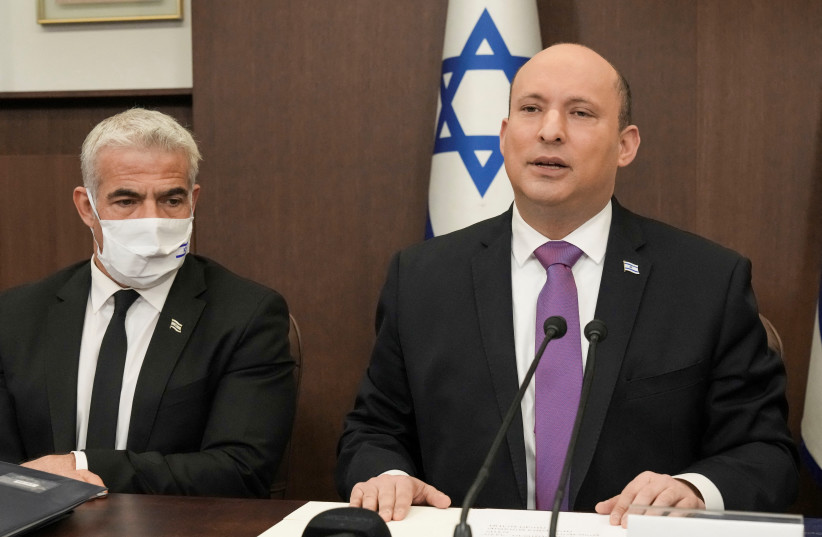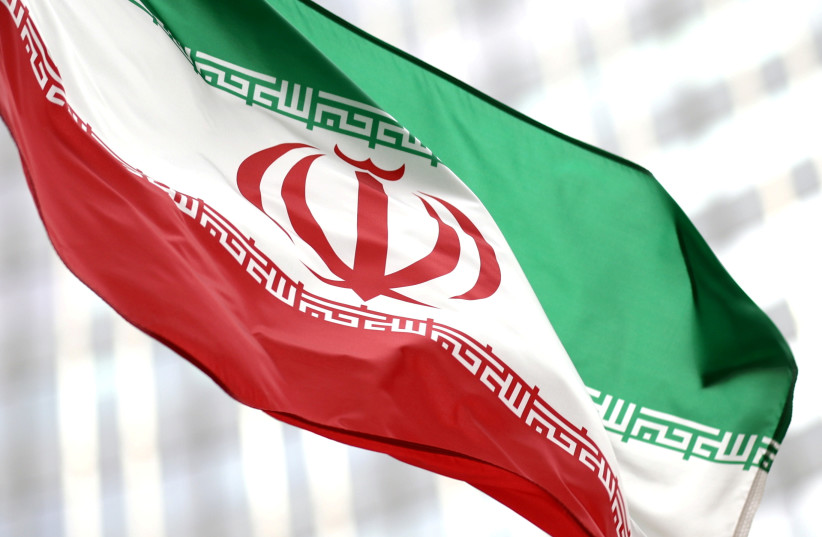by Lahav Harkov, Anna Ahronheim, Reuters
“Since the original deal was signed, two things happened: The Iranians advanced their enrichment capabilities very much, and time has passed.”
 |
Israeli Prime Minister Naftali Bennett chairs the weekly cabinet
meeting with Israeli Foreign Minister Yair Lapid in Jerusalem, February
20, 2022.
(photo credit: Tsafrir Abayov/Pool via REUTERS)
|
Nuclear negotiations may soon end with a deal that is insufficiently tough on Iran, Prime Minister Naftali Bennett warned at the opening of Sunday’s cabinet meeting.
“The talks between Iran and the [world] powers on a return to the Iran deal are very advanced,” Bennett said. “It may be that we will see an agreement in a short time.
“The apparent new deal is shorter and weaker than the previous one,” he added.
Bennett explained that the Joint Comprehensive Plan of Action, signed in 2015, was for 10 years, which means returning to it means a deal in which most of its restrictions on Iran’s uranium enrichment will expire in only 2.5 years.
“Since the original deal was signed, two things happened: The Iranians advanced their enrichment capabilities very much, and time has passed,” he said.
 Iranian
flag flies in front of the UN office building, housing IAEA
headquarters, amid the coronavirus disease (COVID-19) pandemic, in
Vienna, Austria, May 24, 2021. (credit: LISI NIESNER/ REUTERS)
Iranian
flag flies in front of the UN office building, housing IAEA
headquarters, amid the coronavirus disease (COVID-19) pandemic, in
Vienna, Austria, May 24, 2021. (credit: LISI NIESNER/ REUTERS)In 2.5 years, Bennett said, “Iran will be able and entitled to develop and install advanced centrifuges, without restrictions; stadiums full of centrifuges, according to the agreement.
“In return, the Iranians will, at present, receive tens of billions of dollars and sanctions removed,” he said. “In the end, that money will reach terror in the region. That terror endangers us and other countries in the region – as we saw recently – and will also endanger American forces in the region.”
Israel is prepared to protect its citizens security, on its own, in any scenario, the prime minister added.
Bennett also warned that Tehran has insisted that the International Atomic Energy Agency close its investigations of suspected Iranian nuclear sites as part of the deal.
“Iran has been hiding and is still hiding nuclear weapons-related materials as we speak,” Bennett said at the Conference of Presidents of Major American Jewish Organizations’ mission to Israel. “These inspectors that work very hard caught Iran red-handed and now Iran is demanding that these very inspectors pretend to forget what they saw…If because of political considerations [the world] says to the inspectors, ‘forget everything you’ve done,’ that would be a low blow to the IAEA.”
Even if the Biden administration negotiates a deal that Israel feels is not good, “the US will remain our biggest and strongest friend,” Bennett said, “but it is ultimately us in the region, us here in Israel who will bear the consequences.”
Israel’s Defense Minister Benny Gantz warned Sunday that even if a nuclear deal with signed, Iran must be prevented from being a nuclear threshold state.
“A nuclear deal, if signed with Iran – does not mark the end of the road,” he said at the Munich Security Conference. “Action must be taken to ensure that Iran does not continue to enrich in additional facilities, and oversight must be increased. It is essential that the IAEA continues to investigate and monitor open files. We must ensure that the advanced centrifuges are not found in other facilities.”
Gantz said that it is “critical that the sunset clause is not interpreted as an expiration date that enables Iran to revisit its nuclear ambitions. All steps must be taken to ensure that Iran never becomes a nuclear-threshold state. The world must never come to terms with it and Israel will never come to terms with it.”
Israel has been concerned about the possibility of an insufficiently robust deal with Iran in recent weeks, as the participants in the nuclear talks - China, the EU, France, Germany, Iran, Russia, the UK and the US - say they are drawing to a close.
Western parties to the talks have pointed out that time is running out for the JCPOA's nonproliferation benefits to remain relevant.
French President Emmanuel Macron spoke with his Iranian counterpart Ebrahim Raisi on Saturday, urging him to agree to a deal, the Elysee said.
In a phone call that lasted an hour and a half, Macron expressed his conviction that talks had come to a solution respectful of all parties' interests and said Iran should seize the opportunity to preserve the Vienna deal and avoid a major crisis, according to a French presidency statement.
The draft currently being discussed would suspend Iran's uranium enrichment beyond 5% purity, according to diplomats involved in the talks.
It would also freeze $7 billion in Iranian funds stuck in South Korean banks due to US sanctions, and would have Iran release Western prisoners.
After that, Iran would have to return to the main limits of the JCPOA, such as mostly eliminating its enriched uranium stockpile and reducing enrichment to 3.75%. The US would also waive sanctions on Iranian oil.
A letter signed by 250 out of 290 Iranian parliamentarians, published Sunday, stated that US and European parties should guarantee that they would not exit a restored agreement, nor trigger the "snapback mechanism" under which sanctions on Iran would be immediately reinstated if it violates nuclear compliance.
US President Joe Biden cannot legally bind his successors to the Iran deal, which is not a treaty ratified by Congress.
Iranian Foreign Minister Hossein Amirabdollahian said on Saturday that a joint statement by the heads of the US Senate and House of Representatives to back the nuclear deal would suffice as a "political guarantee."
The Iranian lawmakers said in the letter: "We have to learn a lesson from past experiences and put a red line on the national interest by not committing to any agreement without obtaining necessary guarantees first.”
The letter also said a return to the deal should only go ahead if all sanctions were lifted, including those pertaining to terrorism, missile technology and human rights, while the Biden administration has focused only on lifting sanctions on the nuclear program as those that violate the JCPOA.
In addition, lawmakers first want to confirm that Iran receives money from its exports, before the government returns to nuclear compliance, the statement added.
In addition to Iran’s nuclear program, Gantz on Sunday warned that the country’s ballistic missile program, which would provide the capability to carry nuclear warheads, “must be stopped.”
Israel considers Iran’s nuclear program its No. 1 concern and though Tehran consistently denies that it seeking to build a nuclear bomb, Iran has several rockets that can reach Israeli territory, including the Khoramshahr 2 with a range of up to 2,000 km. (1,243 miles) and the Shahab-3.
In addition to its nuclear and ballistic missile programs, the Islamic Republic’s regional hostility is also increasing with attacks against Israeli and Gulf targets from countries like Yemen and Iraq.
Iran, Gantz said, “takes over failed states, forcing them to defend Iranian interests, while committing severe human rights violations.”
“We view with great concern the attacks conducted against our partners in the region – attacks that according to our assessments are being carried out under the guidance and approval of Iranian leadership, employing weapons - some of which are produced in Iran, and implementing operational know-how gained in Iran,” he continued.
Iran has been building an army of unmanned aerial systems for decades and the fleet not only has a significant range of over 2,000 kilometers but has very advanced development and operational capabilities. They have been accused of transferring their drones and know-how to their proxies across the region.
Iranian drones have been behind deadly and devastating attacks against targets at sea as well as at land in recent years.
“Iran violates freedom of navigation. Even worse – Iranian UAV attacks have claimed innocent lives, such as the British and Romanian civilians killed in the Mercer Street Attack off the Gulf Coast,” Gantz said. “Iran also endangers civilian flights, which could be hit by UAVs that cannot change course.”
Due to Iran’s increasingly aggressive moves, Israel has been increasing its strikes against Iranian targets in Syria as part of its war-between-wars campaign to prevent Tehran from entrenching in the war-torn country and smuggling weapons to Hezbollah in Lebanon.
“In this context – I have a clear message for Hezbollah. Their operatives are familiar with the noise made by our aircraft engines, and with their capabilities. If we are required to respond and to attack in order to defend ourselves, we will do so and we will cause great damage to the terror organization and its surroundings,” Gantz said, warning that Lebanon “will, unfortunately, have to be held responsible.”“We will not hesitate to act anytime and anywhere necessary for the security of the State of Israel.”
Gantz, who made the remarks while on a panel discussing the Abraham Accords, said that the accords allowed the “gates of the Middle East” to open to cooperation that would “strengthen our economies, spread innovation and contribute to regional stability and security.”
Lahav Harkov, Anna Ahronheim, Reuters
Source: https://www.jpost.com/breaking-news/article-697052
No comments:
Post a Comment